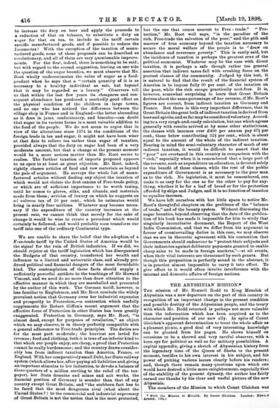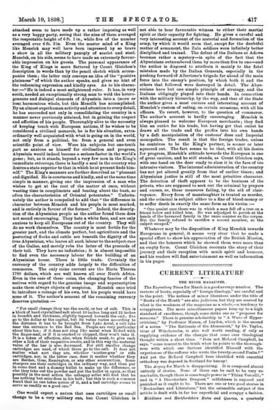THE ABYSSINIAN MISSION.* THE mission of Mr. Rennell Rodd to
King Menelek of Abyssinia was a new departure on the part of this country in recognition of an important change in the present condition and possible destiny of the Abyssinian people, and the treaty with which Mr. Rodd returned is perhaps not more valuable than the information which has been acquired as to the character and position of our new ally. In spite of Count Gleichen's apparent determination to treat the whole affair as a pleasant picnic, a good deal of very interesting knowledge can be gleaned from his pages. He shows himself on occasions to be a shrewd and very careful observer, with a keen eye for political as well as for military possibilities. A capital appendix, giving a sketch of Abyssinian history from the legendary time of the Queen of Sheba to the present moment, testifies to his own interest in his subject, and his power of putting various issues clearly before his readers ; and, though there remain many questions upon which one would have desired a little more enlightenment, especially that of the stability of the present dynasty, the author has fairly earned our thanks by his clear and useful picture of the new Abyssinia.
The members of the Mission to which Count Gleichen was
• With the Mission to Menelik. By Count Gltichon. London: Edwaid Arnold. (164.1 attached seem to have made up a rather imposing as well as a very happy party, seeing that the nine of them averaged the respectable height of 6 ft. 1 in., while five of the number averaged over 6 ft 3m. Even the master mind of a King like Menelek may well have been impressed by so brave a show in all the military panoply of scarlet and steel. Menelek, on his side, seems to have made an extremely favour- able impression on his guests. The personal appearance of the King of Kings is more flattered by Count Gleichen's description in words than by the pencil sketch which accom- panies them ; the latter only conveys an idea of the "positive plainness" of which the author speaks, and gives no hint of the redeeming expression and kindly eyes. As to his charac- ter :—"He is indeed a most enlightened ruler. It has, in very Booth, needed an exceptionally strong man to weld the hetero- geneous and disloyal elements of Abyssinia into a (more or less) harmonious whole, but this Menelik has accomplished. By an almost superhuman activity and attention to every detail, he has succeeded not only in consolidating the country in a manner never previously attained, but in gaining the respect and affection of his people. Thoroughly alive to the necessity of keeping touch with European nations, if he wishes to be zonsidered a civilised monarch, be is for his situation, extra- ordinarily well acquainted with what is going on in the world, not only from a political, bill from a general and even scientific point of view. Were his subjects but one-tenth part as anxious as himself for civilisation and progress, Abyssinia would indeed become a serious factor in the world's game ; but, as it stands, beyond a very few men in the King's immediate entourage, there is hardly a soul in the country who desires a state superior to that in which he at present finds him- self." The King's manners are further described as "pleasant and dignified. He is courteous and kindly, and at the same time simple in manner, giving one the impression of a man who wishes to get at the root of the matter at once, without wasting time in compliments and beating about the bush, so often the characteristics of Oriental potentates." Unfortu- nately the author is compelled to add that "the difference in character between Menelek and his people is most marked, and is entirely in favour of the former." Indeed, the descrip- tion of the Abyssinian people as the author found them does not sound encouraging. They hate a white face, and are only anxious to keep all Europeans out of the country. They will do no work themselves. The country is most fertile for the greater part, and the climate perfect, but agriculture and the pasturing of flocks and cattle are beneath the dignity of the true Abyssinian, who leaves all such labour to the subject-race of the Gallas, and merely robs the latter of the proceeds of their toil They have no industries ; it is almost impossible to find even the necessary labour for the building of an Abyssinian house. There is little trade. Certainly the currency of the country adds largely to the difficulties of commerce. The only coins current are the Maria Theresa 1780 dollars, which are well known all over North Africa. Even in the case of these coins, the changing fancies of the natives with regard to the genuine image and superscription make them always objects of suspicion. Menelek once tried to introduce a coinage of his own, but his people would have none of it. The author's account of the remaining currency deserves quotation :— "For small change they use the mole, or bar of salt. This is a block of hard crystallised salt about 10 inches long and 21 inches in breadth and thickness, slightly tapered towards the end ; five go to the dollar at the capital, but its value varies according to the distance it has to be brought from Lake Arral, a salt lake near the entrance to the Red Sea. People are very particular about this too ; if it does not ring like metal when flicked with the finger-nail, or if it is cracked or chipped, they won't take it. It is a token of affection, also, when friends meet, to give each other a lick of their respective amdes, and in this way the material value of the bar is also decreased. For still smaller change cartridges are used, of which three go to the salt. It does not matter what sort they are, whether 'scatter-gun' or rifle cartridges, nor, in the latter case, does it matter whether they are Berdan, Gras, Remington, or any other ammunition. Some sharpers use their cartridges in the ordinary way, and then put in some dust and a dummy bullet to make up the difference, or else they take out the powder and put the bullet in again, so that possibly in the next action the unhappy seller will find that he has nothing but miss-fires in his belt; but this is such a common fraud that no one takes notice of it, and a bad cartridge seems to serve as readily as a good one."
One would expect a nation that uses cartridges as small 'change to be a. very military one, but Count Gleichen is
not able to bear favourable witness to either their martial spirit or their capacity for fighting. He gives a careful and very interesting account of the material and formation of the army, by which it would seem that, except for the doubtful matter of armament, the Zulu soldiers were infinitely better disciplined and trained. The defeat of the Italians at Adowa
becomes rather a mystery—in spite of the fact that the Abyssinians outnumbered them by more than five to one—and the author is disposed to attribute it mainly to the fatal mistakes made by the Italian Generals, especially in the pushing forward of Albertone's brigade far ahead of the main
force into the enemy's position, by which both it and the others that followed were destroyed in detail. The Abys- sinians have but one simple principle of strategy, and the
Italians obligingly played into their hands. In connection with the military hierarchy, by the way, and that of the State the author gives a most curious and interesting account of
Menelek's custom of eating, on certain occasions, with all his officers. To revert, however, to the question of commerce.
The author's account is hardly encouraging. Menelek is
always pleased to welcome European merchants ; they find him an outlet for his trade, but having got that outlet he draws all the trade and the profits into his own hands
by a deft manipulation of the customs' dues and Imperial monopolies. The result is that the foreign trader, unless
he contrives to be the King's partner, is sooner or later squeezed out. The fact seems to be that, with all his desire for progress, Menelek's attitude towards the European is one of great caution, and he still stands, as Count Gleichen says, with one hand on the door ready to slam it in the face of too intrusive visitors. The internal administration of the country has not yet altered greatly from that of earlier times ; and
Abyssinian justice is still of the most primitive character. The detection of theft appears to be the business of the priests, who are supposed to seek out the criminal by prayers and curses, or, these measures failing, by the aid of clair- voyance. Every form of manslaughter is treated as murder, and the criminal is subject either to a fine of blood-money or to suffer death in exactly the same form as his victim :—
"One quaint case there was in which a man fell off a tree on a friend below and killed him. He was adjudged to perish at the hands of the bereaved family in the same manner as the corpse. But the family refused to sacrifice a second member, so the culprit escaped."
Whatever may be the disposition of King Menelek towards Europeans in general, it seems very clear that he made a special effort to show his appreciation of the British Mission, and that the honours which be showed them were more than an empty form. Count Gleichen recounts the story of their journey and their reception with much spirit and humour, and his readers will find entertainment as well as information in his pages.







































 Previous page
Previous page